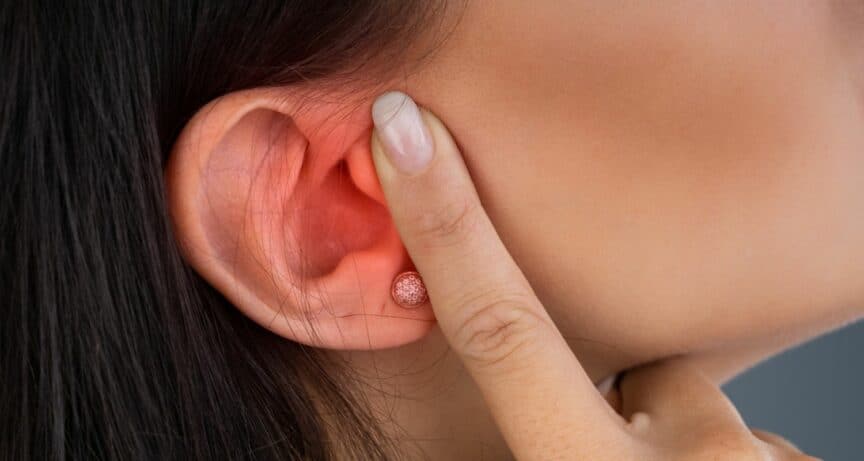Tinnitus is the experience of hearing a specific sound in one or both ears when no external sound is actually present in your environment. This phantom-like noise is often described as a buzzing, ringing, clicking, or whooshing-like sound that can range in severity. Tinnitus can be experienced intermittently or chronically.
According to the Centers for Disease Control and Prevention (CDC), 50 million experience tinnitus, and 20 million live with chronic tinnitus. Tinnitus is not a condition itself but is an underlying symptom of a medical condition. Though over 200 conditions can produce tinnitus as a symptom, hearing loss is one of the most common causes and new studies show that impaired hearing can actually worsen tinnitus.
Understanding the Link Between Hearing Loss & Tinnitus
According to the Hearing Health Foundation, 90% of all cases of tinnitus occur with an underlying condition of hearing loss. Hearing loss is the third most common chronic condition that people live with today. Impacting over 48 million people, hearing loss results in a reduced ability to hear and process sound. This produces a wide range of symptoms and tinnitus is a major one. Hearing loss can be caused by several factors including exposure to loud noise, aging, and existing medical conditions like diabetes and hypertension which affect the blood supply.
Hearing loss most often occurs when there is damage to the hair cells in the inner ear. These sensory cells play an essential role in how we hear and process sound. They help convert incoming sound waves into electrical signals for the hearing nerve to carry to the brain. The brain is then able to further process and assign meaning to these signals, allowing us to understand what we hear. But when these sensory cells are damaged, the auditory pathways or circuits in the brain do not receive the messages they anticipate from the inner ear. The mind, in fact, ‘turns the volume up on those pathways in an attempt to locate a signal. This is comparable to when you turn up the volume on a car radio to hear the music better. The noise result is what we call tinnitus — a high-pitched sound if the hearing loss is high-frequency and a low-pitched if it is low-frequency.
Impact of Hearing Loss on Tinnitus
Studies show that people with hearing loss can experience worsened tinnitus compared to people without hearing loss. This includes a study published in the International Journal of Audiology in 2021. Researchers at an audiology practice in Amman, Jordan evaluated tinnitus among two groups: people with hearing loss and people without the condition. There were 73 participants, 34 with normal hearing and 39 people with hearing loss. Participants had their tinnitus evaluated, were interviewed, as well as had their hearing assessed. Researchers found that:
- tinnitus was severe for 3 people among the non-hearing loss group compared to 16 among the group with hearing loss.
Researchers concluded that tinnitus severity was significantly worse among people with hearing loss compared to those without an impaired hearing.
Tips to Effectively Manage Tinnitus
Fortunately, there are effective ways tinnitus can be managed which is especially useful if you have hearing loss. A few tips you can practice include:
- Treating hearing loss. It is important to start by having your hearing assessed to identify any underlying hearing loss that could be causing or worsening tinnitus. Hearing loss is most commonly treated with hearing aids. These electronic devices abbr, amplify and process sound which provides the ears and brain with ample support. Hearing aids alleviate hearing loss symptoms including tinnitus. Many of today’s hearing aids also offer tinnitus management features that are designed to mask and alleviate tinnitus.
- Tinnitus retraining therapy. This is a specific type of sound therapy that focuses on retraining the brain to interpret tinnitus differently, as mundane background noise.
- Use ambient noise. White noise can distract the brain from tinnitus, reducing its presence and impact. You can use a white noise machine or an app that plays calming sounds in the background.
Contact us today to learn more and to schedule an appointment to have your hearing assessed. We also provide tinnitus management resources and services. Implementing these strategies can improve your hearing and overall wellness.

